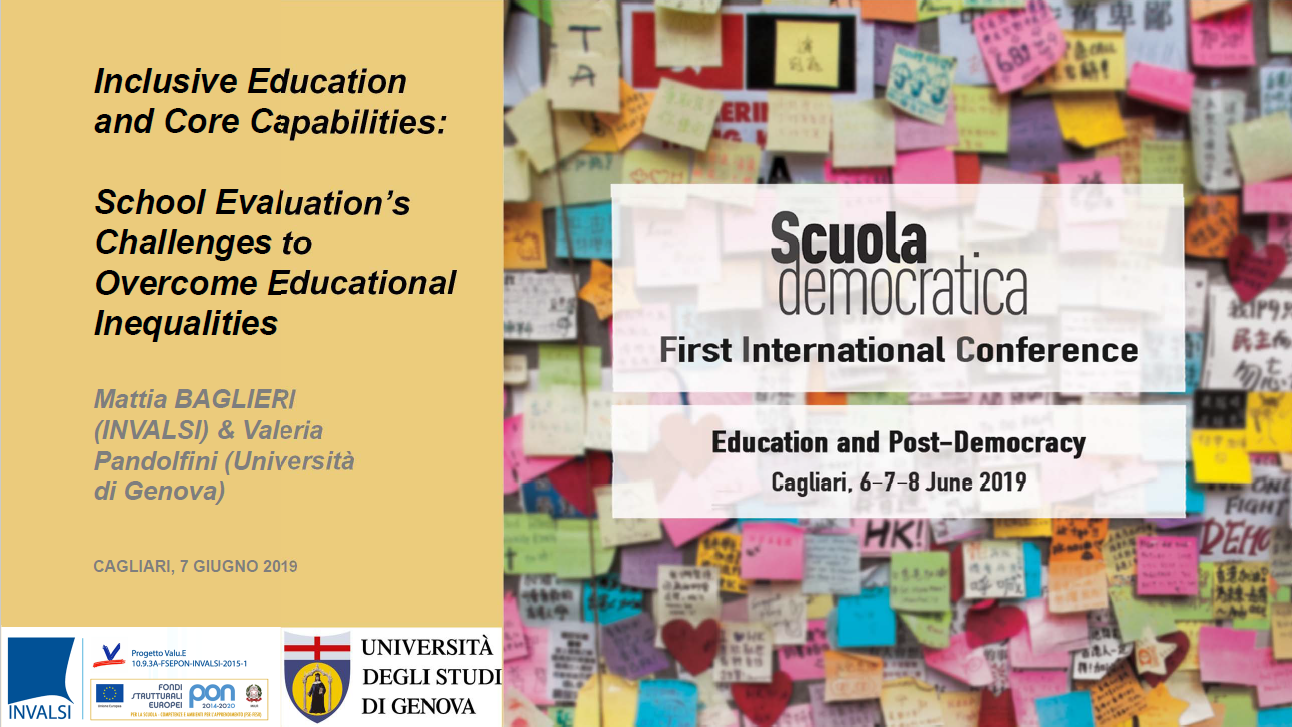Inclusive Education and Core Capabilities: School Evaluation’s Challenges to Overcome Educational Inequalities
Quote
Baglieri, M. & Pandolfini, V. (2019, June 6-8). Inclusive Education and Core Capabilities: School Evaluation’s Challenges to Overcome Educational Inequalities [paper presentation]. Education and Post-Democracy – 1st International Conference of the Journal «Scuola Democratica», Cagliari, Italy.
Description
In the wake of contemporary political philosophy, the Theory of Justice (1971) elaborated by John Rawls argues on the importance of social justice as fairness in order to realize least advantaged individuals’ life prospects. Conceived in an original position, Rawlsian human beings are characterized by a veil of ignorance regarding their socio-economic status. It follows a choice – made by each individual – to safeguard the most disadvantaged positions of the social horizon: this choice is a consequence of the attempt to maximize individual resources. Amartya Sen and Martha Nussbaum recognize in Rawls one of the major architects of contemporary contractualism and individualistic liberalism on which they have rooted their Capabilities Approach: the two scholars dedicated two books to the critique of Rawlsian thought, The Idea of Justice (2009) and The Frontiers of Justice (2006). Sen and Nussbaum themselves devoted many years to the practical application of this liberal theoretical approach, assuming education as the main arena of empirical verification of proactive-institutional support for the development of individual capabilities both in the field of basic education, as well as in the context of inclusive education. According to the Capabilities Approach, education is to be conceived a "basic capability" on a par with being fed (Terzi, 2008), even if the same approach’s theorists disagree on the need to produce a list of fundamental capabilities that institutions must promote: whereas, for example, Nussbaum elaborates a
list of ten Core Capabilities aimed at promoting the proper quality of life, according to Sen the idea of a core capabilities’ closed list results “hyper-deterministic” as every individual should be left free to decide which life they have reason to value. Nussbaum proposes inclusive education as a special place of verification of the Core Capabilities’ she had proposed flourishing (among which health, bodily integrity, emotions, affiliation and play): focusing on the American Law No Child Left Behind (2001), Nussbaum urges for the full development of Individualized Educational Programs for Special Educational Needs’s students.
Method
Literature review, analysis of already existing case-studies (especially applied in Italy, US and UK), analysis of similarities and stackable precincts between the Capabilities Approach and the Italian legislation on inclusive education (especially in relation to the Italian D. Lgs. 66/2017); proposal of analysis of a Delphi Group Questionnaire’s draft to be submitted to Inclusive Education’s and Evaluation’s Experts about the relation between Capabilities Approach and Inclusive Education Policies.
Outcomes
In addition to a theoretical examining of these aspects, this proposal intends to contribute to the debate on the relationship between school, school evaluation (both self as well as external evaluation), equity and inequality in the perspective of the Capabilities Approach, with particular attention paid to inclusive education; reflecting on methods, tools and practices to evaluate potential Core Capabilities’ role in overcoming educational inequalities.
Subject
inclusive educationspecial needs education
special educational needs
disability
basic skills
evaluation of an educational institution
Interest for
EducatorsEvaluators
Families
Researchers
Rights management
Open access. The document is freely downloadable and usable for non-commercial purposes, provided that the authors are always mentioned as reported in the quote field (author, year, title, etc.).Info
- Version
- Downloads
- File Size 1.42 MB
- File Count 1
- Create Date 30 May 2022
- Last Updated 30 May 2022
Print page


